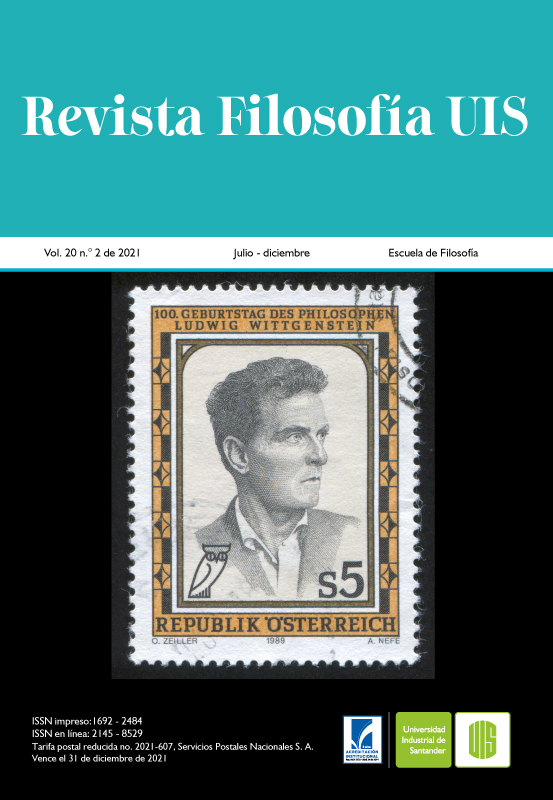«Only a God Would Save Us» Nihilism as a Path to Thinking in Heidegger
Published 2021-06-11
Keywords
- Nihilism,
- thinking,
- salvation,
- Martin Heidegger
How to Cite
Copyright (c) 2021 Revista Filosofía UIS

This work is licensed under a Creative Commons Attribution 4.0 International License.
Abstract
In this article it will be posed, following Heidegger, that Nihilism, far from being a devastating consequence of crisis times, it is rather a donation of these times that allows the event of «thinking». In this horizon of meaning, it will be investigated the origins of the word nihilism and it will be addressed nihilism as the space that prepares the event of the being unfolding [Entfaltung]. Finally, it will be briefly studied the phrase of difficult interpretation "only a god can save us" uttered by Heidegger in an interview to the Spiegel journal.
Downloads
References
- Blumenberg, H. (2011). Descripción del ser humano. (M. Sommer & U. Schoor, trads.). Fondo Cultura Económica.
- Braunstein, N. A. (1988). A medio siglo del malestar en la cultura de Sigmund Freud. Siglo XXI Editores.
- Corona, N. A. (2002). Lectura de Heidegger: La cuestión de Dios. Editorial Biblos.
- Friedrich, J. P. (2005). Alba del nihilismo. (J. Tudela Perez, trad.). Ágora.
- Grondin, J. (2003). Introducción a Gadamer. (C. Ruiz-Garrido, trad.). Herder.
- Heidegger, M. (1977). Política, técnica y filosofía. Revista de la Universidad Nacional (1944 - 1992), (15), 43-70. https://revistas.unal.edu.co/index.php/revistaun/article/view/12298
- Heidegger, M. (1979). Serenidad. (I. Zimmermann, trad.). Ediciones del Serbal.
- Heidegger, M. (1994a). Conferencias y artículos. (E. Barjau, trad.). Ediciones del Serbal.
- Heidegger, M. (1994b). Hacia la pregunta del ser. En Acerca del nihilismo. (J. L. Molinuevo, trad.), (pp. 71-127). Paidós.
- Heidegger, M. (1995). Introducción a la metafísica. (Á. Ackermann, trad.). Gedisa.
- Heidegger, M. (2000). Nietzsche II. (J. L. Vernal, trad.). Destino.
- Heidegger, M. (2005). Aclaraciones a la poesía de Hölderlin. (H. Cortés, trad.). Alianza Editorial.
- Heidegger, M. (2008). La pobreza (Die Armut). (P. Lacoue-Labarthe y I. Agoff, trads.). Amorrortu Editores.
- Heidegger, M. (2010). ¿Qué significa pensar? (R. Gabás, trad.). Trotta.
- Heidegger, M. (2011). Aportes a la Filosofía. Acerca del evento. (C. D. Picotti, trad.). Biblos.
- Heidegger, M. (2012). Sein und Zeit. (J. E. Rivera, trad.). Trotta.
- Heidegger, M. (2013). Seminarios de Zollikon. (Á. Xolocotzi Yáñez, trad.). Herder.
- Heidegger, M. (2014a). Hitos (H. Cortés & A. Leyte Coello, trads.). Alianza Editorial.
- Heidegger, M. (2014b). Caminos de bosque. (H. Cortés & A. Leyte, trads.). Alianza Editorial.
- Hölderlin, F. (2014). Poemas. (E. Gil Bera, trad.). Debolsillo.
- Jünger, E. (1994). Sobre la línea. En Acerca del nihilismo (J. L. Molinuevo, trad.), (pp. 11-70). Paidós.
- Kant, I. (2011). Crítica de la razón pura. (M. Caimi, trad.). Fondo de Cultura Económica y Universidad Autónoma Metropolitana.
- Kierkegaard, S. (2004). Migajas filosóficas o un poco de filosofía. En R. Larrañeta (Ed.). Trotta.
- Ortega, O. (2016). ¿Qué significa pensar? El seguimiento de un camino hacia el pensar en Martin Heidegger. [Tesis de pregrado] Pontificia Universidad Javeriana. https://repository.javeriana.edu.co/bitstream/handle/10554/18932/OrtegaChaconOrlando2016.pdf?sequence=1&isAllowed=y
- Picotti, D. (2007). La transformación del pensar en el tránsito hacia «el otro comienzo» en el planteo de Martin Heidegger. En L. F. Cardona (Ed.), Heidegger El testimonio del pensar, (pp. 181-193). Pontificia Universidad Javeriana.
- Strauss, L. (2008). El nihilismo alemán. En R. Esposito, C. Galli, & V. Vicenzo (Eds.), Nihilismo y política con textos de Jean-Luc Nancy, Leo Strauss, Jacob Taubes, (pp. 125-152). Manantial.
- Villacañas, J. L. (1989). Nihilismo, especulación y cristianismo en F. H. Jacobi. Un ensayo sobre los orígenes del irracionalismo contemporáneo. Anthropos.
- Volpi, F. (2005). El nihilismo. (C. I. Del Rosso & A. G. Vigo, trads.). Biblos.

